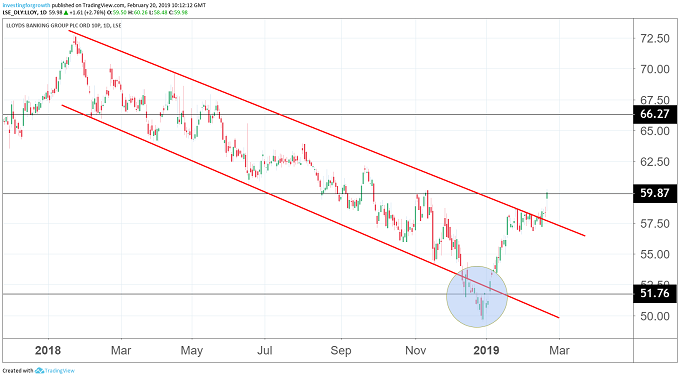Why Lloyds Banking Group pleased its City fan club
Our head of markets explains why the City reacted positively to these results despite a profits miss.
20th February 2019 10:28
by Richard Hunter from interactive investor
Our head of markets explains why the City reacted positively to these results despite a profits miss.

Despite missing expectations at a pre-tax profit level, Lloyds Banking Group (LSE:LLOY) is not only in rude health but also has a clear vision on where next to take the business.
The bank describes its own model as simple and low risk, and to some extent this lack of complexity allows the bank to concentrate fully on its stated aspirations.
Its digital presence, for example, is already market-leading, but there should be more to come. A £3 billion investment into the business should reap benefits, whilst the group's move into financial planning and the tie-up with Schroders are both clear opportunities.
Meanwhile, in terms of performance, the bank is comfortably ticking the majority of boxes. Post-tax profit is up 24%, Net Interest Margin has improved, there are positive jaws of 5% [jaws compares income versus operating expenses#] and the capital cushion is nudging 14%.
In addition, the guided return on equity number is healthy and the cost/income ratio, whilst slightly higher than the figure reported in the third quarter, is nonetheless lower than the previous year and at 49% is a figure which its competitors will be glancing at with some envy.
The tight control of the business has also enabled a share buyback of £1.75 billion, alongside a dividend yield of 5.4%, both of which signal management confidence in prospects.

Source: TradingView (*) Past performance is not a guide to future performance
Negatives within the results are few and far between. The previously announced (and disappointing) extra payment protection insurance (PPI) provision is now hopefully nearing its ultimate conclusion, whilst the 18% rise in the impairment figure will need to be monitored closely.
Meanwhile, Lloyds bears the additional burden within an embattled sector of being seen as a proxy for the UK economy, where of course prospects remain unclear post-Brexit, despite signs of resilience thus far. Any increase in interest rates in the event of a positive outcome could put some pressure on the loans Lloyds has been making, but there seems to be enough meat on the bones to withstand any such strain.
The share price has suffered in a way the company has clearly not. A 14% decline over the last year compares to a marginal drop for the wider FTSE 100 index of 0.9%, although there has been an uptick of 4% over the last quarter.
This therefore leads to the dilemma of whether investors should take the plunge, since in the event of a positive Brexit result the stock would surely be subject to a significant reappraisal. The market certainly seems to think so – the current consensus of the shares comes in at a ‘strong buy’.
Jason Napier, an analyst at UBS, has been bullish on Lloyds for some time. He continues to rate the shares a 'buy' with price target set at 80p.
Lloyds shares trade on just 7.4 times earnings per share estimates for 2019, at a big discount to European peers, and yield 6%. "We think the stock is good value and remain a buyer," says Napier.
# jaws refers to a chart that plots both metrics against one another giving the visual impression of a set of jaws. Positive jaws demonstrate that income growth is exceeding growth in operating expenses.
*Horizontal lines on charts represent levels of previous technical support and resistance. Trendlines are marked in red.
These articles are provided for information purposes only. Occasionally, an opinion about whether to buy or sell a specific investment may be provided by third parties. The content is not intended to be a personal recommendation to buy or sell any financial instrument or product, or to adopt any investment strategy as it is not provided based on an assessment of your investing knowledge and experience, your financial situation or your investment objectives. The value of your investments, and the income derived from them, may go down as well as up. You may not get back all the money that you invest. The investments referred to in this article may not be suitable for all investors, and if in doubt, an investor should seek advice from a qualified investment adviser.
Full performance can be found on the company or index summary page on the interactive investor website. Simply click on the company's or index name highlighted in the article.